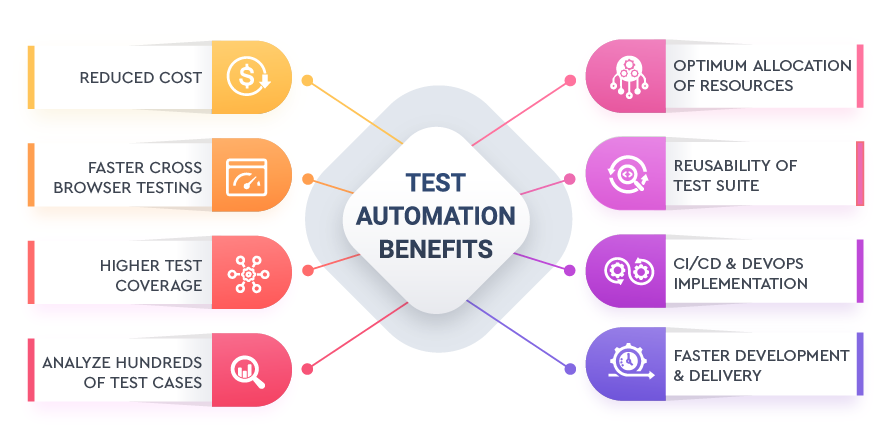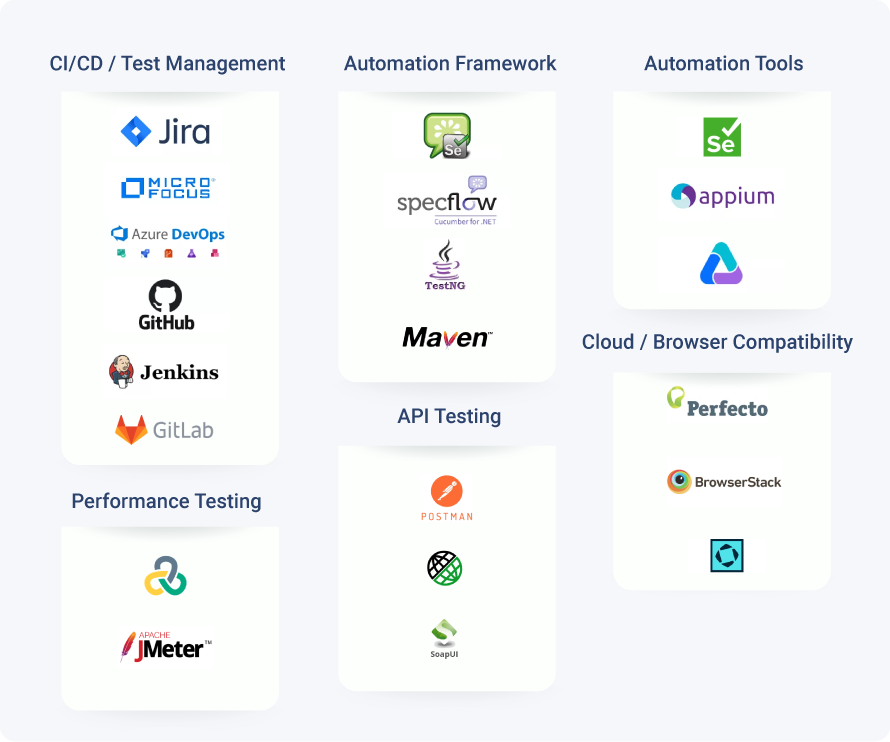From the launch of the first-ever mobile arcade games to modern-day feature-rich web apps, the complexities of software development have quadrupled at a rapid pace! Plus, with emerging technologies, rising competition & ever-increasing consumer demands, delivering top software quality at a competitive price with speedy delivery has become a strategic imperative for business success.
So how do businesses cope? The answer is Test Automation!
It will accelerate your development cycles, help you avoid tedious, repetitive tasks, and improve software quality. So how do you get started? This blog tells you how to leverage test automation to deliver new products and services faster – but certainly not at the cost of quality!
Why Automation Testing is a Must for Modern Businesses
The implementation of DevOps and Agile methodologies to deliver software projects is pushing the demand of speed and efficiency – more than ever. As a result, test automation services have emerged as the key for the organizations to keep up with the pace of modern software delivery.
Here, we’ll take a closer look at some of the reasons why organizations must embrace automated testing;
- Ease concerns over quality assurance
- Optimize the resources usage
- Achieve greater depth and coverage
- Reduce feedback cycles with improved insights
- Accelerate solution time-to-market
- Reduces the specialist skills need
- Simultaneous testing across platforms and devices
- Remove human-imposed limitations
- Improve accuracy, remove human errors
Benefits of Automation Testing

1. Reduced Cost: By using an automated test environment, a business saves money as fewer resources are used on product testing. Paul Grossman’s white paper shows how test automation can reduce the expense of each test hour from $78 to $17.54. Automation can be costly to install and implement in the initial stage, but in the long-haul manual testing costs far more!
2. Faster Cross Browser Testing: An Automated tool like LambdaTest significantly reduces the testing time and effort by running the same test cases several times on multiple browsers simultaneously. Manual testing does not suffice to perform cross browser testing on different browser versions. This is where automated selenium testing is needed to run the required number of tests in a short span for several real browser-device OS combinations.
3. Higher Test Coverage: Unlike manual tests that have limitations in terms of the number of tests you can verify, automation allows test engineers to write new tests and add them to the automated test suite. This increases the test coverage so even as more features are added, they are properly tested for a high-quality app. Also, test automation allows more in-depth testing for complex use cases.
4. Accurate Reports to Analyze Hundreds of Test Cases: Test automation engineers can easily view what scripts have been written, what other engineers have worked on, what tests have been performed and which bugs have been found and fixed so far with reliable reports. With LambdaTest, you can easily extract every piece of information related to the execution of an automated test suite without having to log into the platform.
5. Optimum Utilization of Resources: With test automation taking care of repetitive tests, QAs can shift their focus to tasks that need their intellectual engagement. For instance, they can now spend time on running tests that cannot be automated, formulate new test cases, review automated test results, or decide on advanced testing metrics.
6. Reusability of Test Suite: An automated test suite makes it very easy to reuse tests for other projects. Having built an automated test suite for varied projects across industries, we’ve gained an in-depth understanding of implementing an automated test suite along with relevant tools such as a continuous integration pipeline. This enables us to replicate this experience and knowledge to rapidly set up your test automation for projects of every size and scope.
7. CI/CD and DevOps Implementation: You cannot avoid test automation if you want to implement DevOps & continuous delivery practices. In the CI/CD pipeline, developers must commit source code frequently and test it. And there’s no way to accomplish this rapidly and flawlessly in the absence of test automation. Only if you have adopted automated testing, can you switch to continuous testing and delivery swiftly & seamlessly.
You may also have issues orchestrating test automation across your CI/CD pipeline. And things may get out of hand when code complexity and the number of test cases increase. This is where we can help! Leveraging AI-powered solutions that assist with smart testing orchestration, we enable you to find and fix bottlenecks faster & maximize the benefits of automated testing.
8. Fast Development: Automated tests are rapidly executed and can be run repeatedly. So, you don’t have to wait for weeks to run the tests all over again – just a few hours are enough. Due to the fast pace and repeatable nature of automated testing, development and delivery are accelerated.
If you want to leverage software testing & QA services to enhance your product performance & stay ahead of the curve, Rishabh can help.
Importance of Automation Testing in the SDLC
Despite repeated & rigorous manual testing during development cycles, delivered software products are never without defects. Bugs always manage to creep in and often reappear even with the best approaches in place. Test automation software is the most effective way to increase the speed, efficiency and coverage of software testing.
Here at Rishabh, our automation testing services can fast track your web and mobile app releases. We deliver value with our extensive experience in integrating automation QA services into the development and testing process. The quality of your product is our number one priority and so, we leverage DevOps methodologies and agile testing from day one even with minimum viable products.
Different Types of Automation Testing
Let’s take a look at the various testing types and understand what they are meant for.
1. Unit Testing: A unit refers to the smallest piece of code that can be logically isolated. This is a function for most programming languages. A unit test does not interfere with other codes or interact with a network, database, or configuration file. If the function holds such interactions, they should be stubbed. The ultimate goal of unit testing is to check if the isolated logic is correct.
2. Functional Testing: It aims to assess the function along with integrations. So, there is no need to fake calls while writing tests. In simple words, the functional test takes an input and transforms it into an output that compares the outcome with the expected results.
3. Regression Testing: It helps assess the quality of an app. For instance, a certain API endpoint with a specific code can handle 1500 requests every minute. Wherever a new feature is added to the product, the QA engineer runs regression tests to detect if the API endpoint can still process the same amount of requests or even more.
4. Smoke Testing: It enables the QA engineer to validate if the deployed product is stable or not. Often, this is the quick verification step before proceeding to the next test. It typically holds a limited number of tests to determine the build’s stability.
5. Black Box Testing: With black-box testing, the internal code structure is not considered. It only takes the inputs and outputs into account. The tester does not need any prior knowledge of the product or any form of documentation. The goal is only to decipher the usability of the app and it ultimately aims to find errors in the interface, performance, functions. startup and termination. While it is hard to automate black-box testing, it is highly beneficial.
6. Integration Testing: A testing engineer who is responsible for performing integration tests wants to know how two or more systems will work in sync. These systems can range from an API to a database. For instance, if the tester wants to evaluate if the TweetDeck tool works optimally on top of the Twitter API, he will check if the two products work together to ensure the integration is successful.
Automation Testing Tools
The ever-increasing demand for delivering quality software at speed has compelled businesses to switch to solutions in agile, continuous integration and DevOps methodologies.
Test automation is a vital element of these aspects. And below are the top test automation tools that are extensively used for minimizing redundant, manual efforts:

Why Choose Us to Accelerate Your Release Cycle
Our team leverages proven methodologies while ensuring they align with customers’ business goals. Skilled at performing cross-browser and app testing, they have experience working across more than 200 real devices and web browsers. Rishabh’s testing CoE offers unification of custom test automation strategies, leading-edge frameworks with the right tools that minimize risks. From a comprehensive assessment and strategy formulation to POC and support, we ensure a seamless experience.
As an experienced technology partner, we’ve managed several environments, developed frameworks, implemented CI/CD pipelines, and managed and maintained several test scripts while slashing the development costs for our global clients.
Have a look at how we’ve enabled companies like yours to deliver superior quality solutions, even under tight deadlines.
Use Case:
An EU-based global real estate developer serving 23 countries turned to Rishabh to automate their end-to-end testing module as a part of their product modernization initiative.
Their key challenges were:
- Poor site navigation was leading to client dissatisfaction
- Multiple teams managing diverse housing needs led to cost and schedule overruns
- Lack of a standard, reliable process for testing
- Ad-hoc updates to a unified system
- Poor estimations coupled with the competitive threat
Team Rishabh transformed their legacy system into a unified web portal that efficiently covered every aspect of the software testing process using Jira. This significantly improved product quality, bug fixing time and user experience, thereby resulting in:
- 89% reduction in downtime issues
- 63% improvement in user engagement
- 25% cost optimization
- 50% increase in inquiries
To conclude, automated testing saves a lot of time, effort and cost, enables quicker feedback, ensures consistency and delivers faster results. All of this contributes to increased productivity and maximized profits. Such automated testing advantages can make a massive difference to SMEs that consistently endeavor to achieve a sustainable competitive edge.











 30 Min
30 Min


